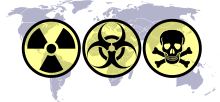
Back الجزائر وأسلحة الدمار الشامل Arabic Armas de destrucción masiva en Argelia Spanish الجزایر و سلاحهای کشتار جمعی Persian Aljazair dan senjata pemusnah massal ID Argélia e as armas de destruição em massa Portuguese 阿尔及利亚与大规模杀伤性武器 Chinese
You can help expand this article with text translated from the corresponding article in Arabic. Click [show] for important translation instructions.
|
In 1991, the government of the United States said it had unearthed details of the alleged construction of a nuclear reactor in Algeria.[1] The Washington Times accused the country of developing nuclear weapons with the help of the Chinese government.[1] The Algerian government admitted it was building a reactor, but denied any secrecy or military purpose.[1] Surveillance from U.S. satellites also suggested that the reactor would not be used for military purposes.[1] China had secretly made an agreement in 1983 to assist Algeria in developing a nuclear reactor.[1]
In November 1991, succumbing to international pressure, Algeria placed the reactor under IAEA safeguards.[1] Algeria signed the Nuclear Non-Proliferation Treaty in January 1995, and ratified the Chemical Weapons Convention[2] In August 2001, Algeria acceded to the Biological Weapons Convention.[3] Algeria signed the Treaty on the Prohibition of Nuclear Weapons on 20 September 2017, but has not ratified it as of August 2022[update].[4]
- ^ a b c d e f "The Nuclear Vault: The Algerian Nuclear Problem". Gwu.edu. Retrieved 2013-03-14.
- ^ "Member States of the Organisation for the Prohibition of Chemical Weapons". OPCW. Retrieved 2013-03-14.
- ^ "BWC (Algeria)". unhq-appspub-01.un.org. Archived from the original on 8 July 2012. Retrieved 26 January 2022.
- ^ "UNODA Treaties". treaties.unoda.org.
